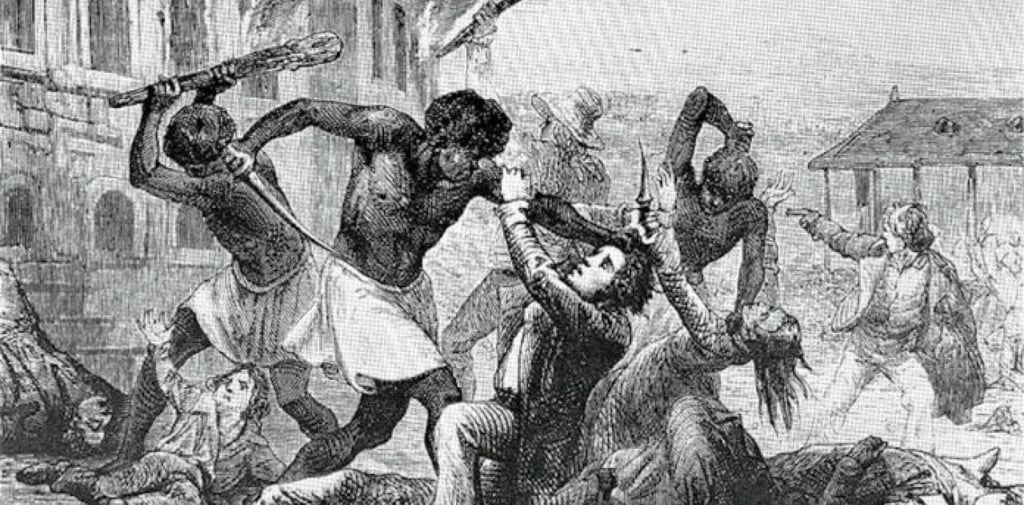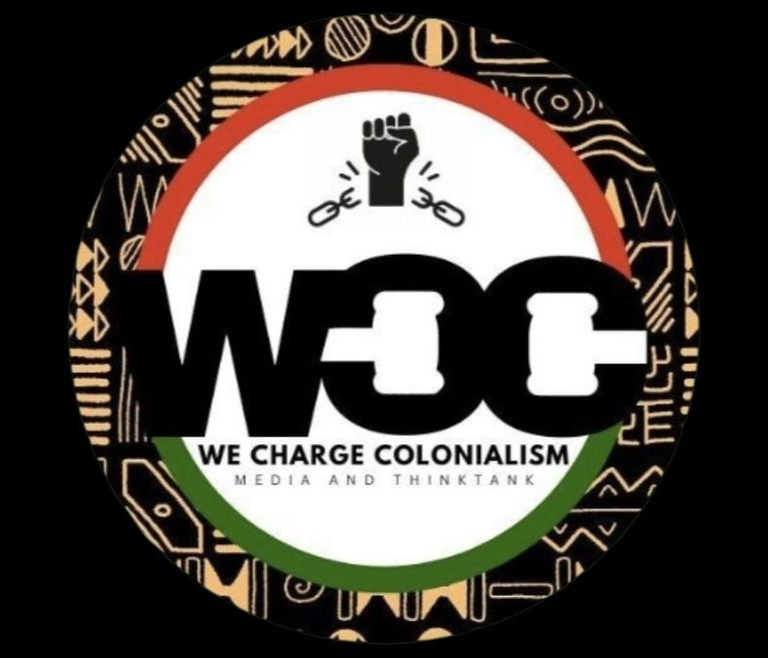The Afrikan Offensive in Haiti: A Retrospective
Haitian Revolution or Afrikan Offensive in Haiti ?
Nehemi'EL Simms-Ibrihim
4/12/20256 min read


A part of our return to righteous living and sovereignty as Afrikan people is dealing with the complexity of myth and folklore and their intersection with the development of an Afrikan national consciousness. On the one hand, myth and folklore, primarily oral modalities, have always occupied an important area in our culture because of a deep regard for wisdom, stories, and memories that are accessible to all. On the other hand, history that has been left on the shelf can devolve into the obscure realm of “legend.” This simultaneously links groups of people together, albeit with opaque contextual frames that leave little-to-no room for the average person to enjoy the minerals carefully dug up from tales of yesterday. For this reason, I find it appropriate to introduce our topic of Haiti’s “revolution.” While I believe it to be meaningfully intended, Haiti occupies “legendary,” or “mythic” status within popular black movement activity discourse that, according to my observations, makes dangerously unclear assumptions and which ultimately obscures its potential to be of use to our struggle in 2025. How do we as movement workers reconcile trying to “make it plain” without compromising the complexity of the issue/situation at hand ?
I will not be able to discuss all that our Haiti has to teach, but I am intending to pose questions aimed at uncovering Haiti's complexity and the application of that complexity to contemporary pan-Afrikan praxis. Along with pursuing lines of thought and investigating sources that challenge popular narratives and propose a recharacterization of the conflict as an offensive rather than a revolution, I also intend to show – what I believe to be an under-represented point – the distinctly “Afrikan” nature of the Offensive’s development. That is, our consideration of the politico-cultural reality of Haiti, specifically between 1758-1791, can be explained by uncovering the politico-cultural reality of contemporary Afrika. Additionally, I intend to establish grounds for Haiti’s consideration as a core state in the development of a national consciousness and national culture upon which pan-Afrikanism is contingent.
More precisely, the resistance of Afrikan nations to enslavement, as a stimulant for early manifestation of pan-Afrikanism, is typified within the scope of Haiti's history and political activity as an entity being acted on by all sides of the geo-political hodgepodge known as the Triangular Trade or Atlantic World. Haiti is important within the context of the Atlantic world's development, in the time period of the Mackandalist conflict until the American Civil War.
Initially, in “Political Economy of St. Domingue: Social Structure, Production and Globalization” we consider Haiti as the central point of production in the Caribbean and a pillar within the entire Triangular Trade and the burgeoning world economy. Its brutality, the source of its incredible production of sugar, made it the cornerstone of the New World economy, and more importantly, considering relations amidst Western ruling elite, made it a major player within regional geopolitical interests as they jockeyed for influence. Understanding the interests of Western ruling elites (Britain, France, and America) warrants an attempt at taking a deeper look into the social structure, global economic context, and brutality that made St. Domingue the most productive colony in the Western Hemisphere. Likewise, a deeper investigation of the different interest groups among the Afrikan population, and “mulatto” group is warranted as well: The “bossales” portion of the population, the role of the “house slaves,” the role of Afrikan spiritualism, and the decentralized character of the 1791 uprising are the factors we will try and consider in analyzing the social dynamics of the period.
Then, in “Jefferson, the Quasi War, and Louisiana Purchase” we discuss the Jeffersonian policy of containment and isolation of Haiti. That the American ruling elite in particular, and Western global hegemony in general, had a special regional interest in Haiti's containment is not to be overlooked. A French-controlled St. Domingue was a threat to the regional interests of American capital. A pan-Africanist Haiti was a threat to the entire system of colonial capitalism and global white hegemony. Furthermore, we contend with the idea that the social philosophy of “American democracy,” codified by Euro-American thinkers like John Jay, James Madison and Thomas Jefferson, and expansionist in inception, not only required the elimination of French-controlled St. Domingue, along with other French-controlled areas on the North American mainland, but the containment and isolation of Haiti as a neo colony as well. We then analyze Haiti’s symbolic significance to both Afrikan bondsmen, trying to forego the fetters of ethnocentrism and forge a new national-civilizational identity, amd the global white hegemon, to whom the problem of Haiti presented a contradiction with multi-faceted implications. Finally, we confront the irreconcilability of the expansive requirements of both pan-Afrikanism, represented by Haiti, and colonial capitalism, represented by the U.S. This dialectic is important to consider when trying to imagine counter-modernities and their implications.
Up to the present moment, the connection between political conflicts in Africa have scarcely been proposed as a major factor in Western Hemispheric affairs, although the two regions have been intimately connected for hundreds of years. For that reason, in “The Limitations of Our Offensive” we attempt to understand the struggle between internal political factions, sects and interests of the “Afrikan” population and the effects their importation had on events in the Atlantic world. Recognizing that many of those Afrikans held in bondage, and those who participated as combatants, were versed as trained soldiers, administrators, and their own particular assortment of political philosophy begs the questions: how did the interaction of different Afrikan ethnic groups influence the ebb and flow of the political terrain of the day? How did different groups of Afrikan people navigate the modes of social organization, language barriers, and political baggage imported with them from the complex social reality of their realm to the sadistic environment of St. Domingue ? Haiti highlights the complexity of race-ethnicity, class struggle, globalization and statecraft as themes in liberation struggles during the Age of Revolution, which oftentimes leaves out political developments happening on the other side of the Atlantic. We seek to expand this Age of Revolution to include the dynamics of Central and West Afrikan statecraft and politics. Even more so, Haiti demonstrates the dangers of “independence,” and exposes the mutation of Imperialism to its neocolonial form in the Western Hemisphere 150 years before Nana Nkrumah's exposition on the subject.
Lastly, in “Haiti's Role in the Development of a More Scientific Pan Africanism” we seek to demonstrate Haiti being critical in the development of 19th century pan-Afrikanism; an active and critical stepping stone, that cannot be overlooked, in the formation of our understanding of pan-Africanism. Haiti stands as one of the earliest (in the Western hemisphere) definitive expressions of “Blackness,” both constitutionally and organically. By the same token, the legacy of Haiti, both historical and contemporary, carries the potential to occupy a central role in extant pan-Afrikanism because of our failures and triumphs. Its symbolic potential, along with its historical significance, inform our racial-national and class consciousness as Afrikan people globally face a rapidly changing world. An applied understanding and critical interpretation of Haiti is critical to our survival and development in that Haiti holds key insights to both contradictions internal to Afrikan people and the behavior of white supremacist imperialism. In fact, Haiti ought to be investigated from the particular meaning of the struggle that occurred there from the vantage point of each of these groups, which undoubtedly is an incredible task.
Summarily, I have attempted to provide a concise description of the Mackandal conflict, the Creole conflict of 1790, and the Afrikan conflict 1791 in order to demonstrate the lineage of the Offensive. I have also attempted to describe the internal dynamics of the Afrikan front and the struggle of the Offensive to maintain a pan-Afrikanist character. Concurrently, my attempt to describe the internal dynamics of the Western ruling elite and their interests in Haiti serves the purpose of exposing the complexity of the West. In order to demonstrate the idea of the expansionist nature of “American democracy” and its conflict with French-Haiti and pan-Afrikan Haiti as a stepping stone in control of the region I attempt to describe the rivalry between the interests of pan-Afrikanist, European, and American ruling class in control of the North and South American region and their role in developing modernity and a potential counter modernity. The role that Jeffersonian thought influenced U.S Policy towards Haiti is critical. Finally, I attempt to describe the role that vodou (Afrikan cosmogony-cosmology/spirituality) and central Afrikan political philosophy played in guiding the thought and character of the Afrikan conflict. All this in an effort to entertain the controversial question: Was the conflict a revolution ?
